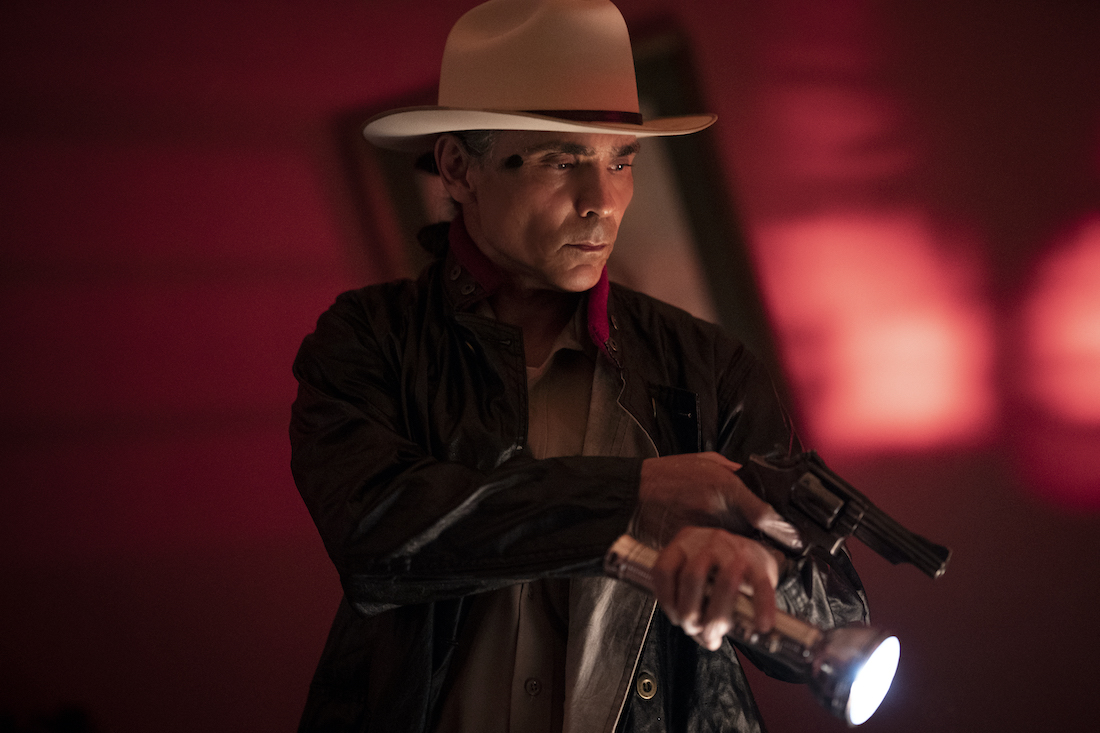AMC’s six-episode series “Dark Winds” comes at the intersection of a couple of watershed moments for contemporary television. First, there’s the rise of the prestige murder-mystery series, as personified by hits like “True Detective” (whose iconic title sequence is echoed in the shadowy, ephemeral energy of this show’s opener) and “Mare of Easttown.”
But there’s also the rise—far, far later than it should have arrived—of stories about Native American and Indigenous peoples created both for and by Native creators; “Reservation Dogs,” “Rutherford Falls,” and even films like “Blood Quantum.” “Dark Winds” is but the latest in that effort of cultural reclamation, a Native-led show shot by the first Native American-owned film and TV studio, Camel Rock Studios, located on Tesuque Pueblo land. And as its inaugural attempt to produce prestige-level television of the level its non-Native contemporaries enjoy, it’s a riveting one.
Based on the Tony Hillerman mystery novels (some of which have been adapted previously in films like 1991’s “The Dark Wind,” which starred Fred Ward, and a trio of PBS adaptations starring Wes Studi and Adam Beach), “Dark Winds” sets itself in the Navajo Nation in 1971, with—naturally—a pair of reluctant partners forced to team up to connect the various cases they’re tasked with solving. Lieutenant Jim Leaphorn (“Westworld” and “Reservation Dogs”’ Zahn McClarnon) is the head of the Navajo Tribal Police, a tough but wearied sheriff tasked with solving a mysterious double homicide in the area. Meanwhile, newcomer Jim Chee (Kiowa Gordon) returns to the Navajo Nation, tasked by FBI agent Whitover (Noah Emmerich, channeling all his smarmy “The Americans” energy) with tracking down the men responsible for an armored truck robbery weeks prior. The men are thought to have put their helicopter down in Navajo country, and it’s Chee’s job to find them, under the smokescreen of helping Leaphorn with his murder investigation.

But there’s of course more to this case than meets the eye, and “Dark Winds” rolls out those mysteries at a welcome pace over its six episodes. For such a comparatively independent production, the show looks quite good, save for a few dodgy helicopter effects in its opening minutes. The real production value, in addition to the gorgeous New Mexico plains and mountains, is its cast, led by McClarnon (who’s finally enjoying the kind of robust career he deserves after decades in the trenches). He’s a magnetic presence, his Leaphorn carrying decades of pain and resolve amid his hunched shoulders and stoic gaze. Leaphorn is a creature of necessity, an Atlas holding his community’s health on his shoulders, even as it affects his relationship with his wife, Emma (a similarly impressive Deanna Allison).
Compare that to Gordon’s Chee, a cocksure young man with complicated feelings about his youth on the reservation, and who ran towards white assimilation, education, and acceptance. He clashes often with fellow Tribal officer Bernadette Manuelito (Jessica Matten), who’s far more tied to both her Native identity and the strains of mysticism that punctuate the plot. Even as a mere showcase for incredible Native talent, “Dark Winds” offers its main cast plenty of solid material to chew on.
Early on, Chris Eyre (writer/director of the incredible “Smoke Signals”), who directs the pilot, shows us Chee’s face reflected in a portrait of John Wayne. In another shot, the town’s marquee proudly touts a showing of the 1970 film “Little Big Man.” So much of “Dark Winds” is concerned with reclaiming the Western from the white faces that dominated it throughout film history, and lets its characters wrestle with what that means.
What’s more, the whodunnits of it all pale in comparison to the broader story show creator Graham Roland (“Jack Ryan”) and Eyre want to tell here. Amid the shootouts, double-crosses, and bread crumbs Leaphorn and Chee follow in order to solve the mystery lies a story about what justice even looks like on Indigenous land. Native characters like Leaphorn take none too kindly to white interlopers—in the opening scene, Leaphorn makes a thief re-bury Native artifacts he’d stolen, practically at gunpoint—and see the FBI’s sudden intervention in Navajo affairs as them paying attention to “white problems.” As the mystery unravels, secrets unfurl about the white pillaging of Navajo land and the physical consequences on the Navajo who live there. Activists stand in the way, but (as in many stories like these) their very reasonable points are muddied by the unscrupulous means they employ to send their messages.

Virtually every character has been touched by the specter of white re-education, the history of Native sterilization, and the economic and spiritual oppression committed against Native populations across all of America’s ugly history. In the end, these are more compelling stories to tell than who killed whom, and whether our boys will track them all down.
“Dark Winds” isn’t perfect by any means; while the 45-minute runtime is a welcome respite from the bloated lengths of many a prestige drama of late, the show still takes some distracting detours from time to time. Some elements, like a Mormon family who buys the wrong chintzy cactus painting at the wrong time, or Rainn Wilson as a thinly-drawn used car salesman who plays a tangential role in the eventual mystery, feel somewhat vestigial and take time away from the show’s more interesting wrinkles. (The show’s insistence on filling in unnecessary blanks in flashbacks prior to the armored car heist every episode eventually feels redundant, too.)
But these are mere quibbles compared to what the cast and crew of “Dark Winds” have accomplished here: A heartfelt and accomplished thriller that doubles as a proof of concept for Camel Rock Studios’ ability to tell Native stories in popular television genres. It’s a stellar showcase for McClarnon as the kind of screen presence that can headline a show like this, too. Lord willing, “Dark Winds” gets enough attention to further a second season, and a whole host of Camel Rock productions down the road.
All of season one screened for review. “Dark Winds” premieres on AMC and AMC+ on June 12.












